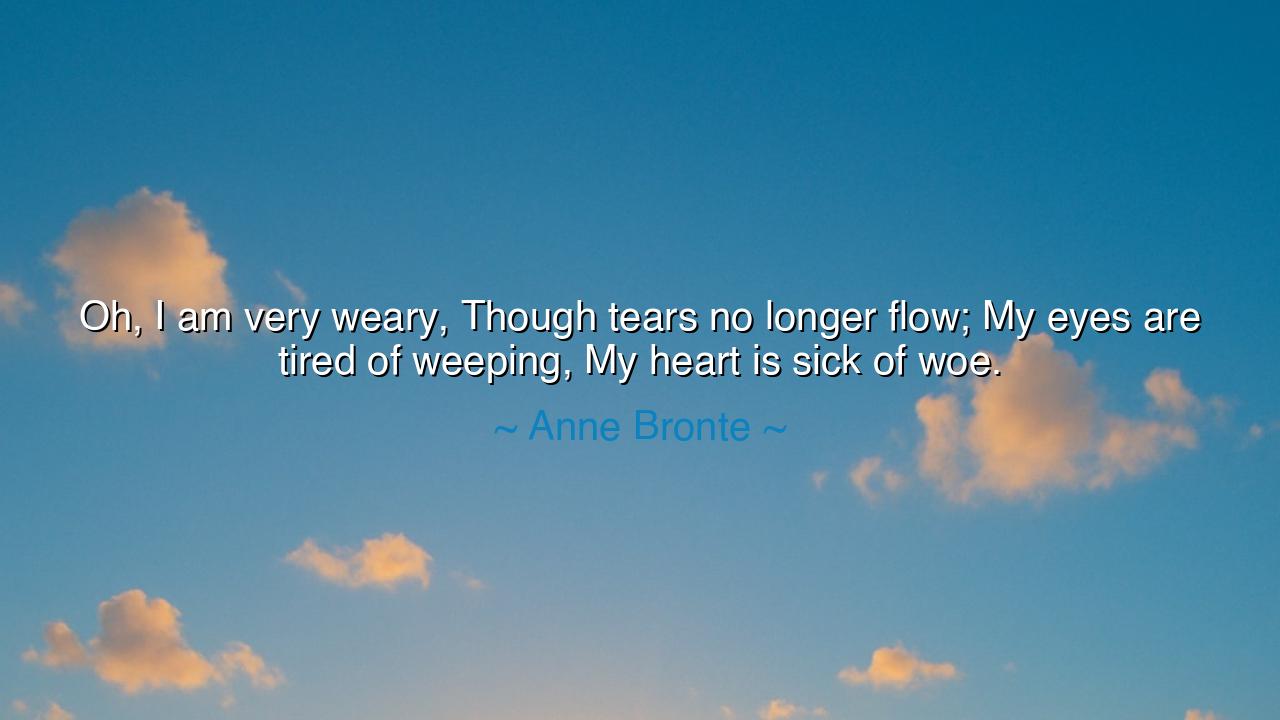
Oh, I am very weary, Though tears no longer flow; My eyes are
Oh, I am very weary, Though tears no longer flow; My eyes are tired of weeping, My heart is sick of woe.






The words of Anne Brontë, “Oh, I am very weary, Though tears no longer flow; My eyes are tired of weeping, My heart is sick of woe,” rise like a sigh carried on the wind of human sorrow. They are not mere poetry — they are a confession of the soul when grief has burned itself to ashes, when pain no longer cries out but lingers as silence within the heart. In these few lines, Anne gives voice to the ancient weariness that comes not from the body, but from the spirit — that sacred fatigue born of endurance, loss, and love unhealed.
To understand her words, one must remember that Anne Brontë was no stranger to sorrow. She lived in an age shadowed by death, where illness carried away those she loved one by one — her mother, her sisters, her brother. Yet through it all, she did not grow bitter. Her poetry, though steeped in melancholy, carries an undertone of faith and quiet strength. In this particular verse, she reveals the point at which tears have dried, not because healing has come, but because the soul has wept all it can. It is the stillness that follows a storm — not peace, but exhaustion.
The ancients knew this feeling well. They called it the weariness of the heart, when grief becomes so deep that even sorrow loses its voice. Yet they also taught that this moment, though dark, is sacred. For when the heart grows tired of woe, it stands on the threshold of transformation. Tears may no longer flow, but wisdom begins to take their place. It is in this stillness — when the human spirit has felt the full weight of its suffering — that understanding is born. Thus, what feels like despair is often the soil from which strength quietly blooms.
History gives us many examples of such weary souls who found light beyond sorrow. Consider Helen Keller, who faced the double darkness of blindness and deafness. There were years when she, too, must have felt weary — when her heart was sick of woe, and tears could no longer fall. Yet from that silence, she drew a strength that would inspire the world. Like Anne Brontë, she transformed her suffering into wisdom, her weariness into purpose. For both women, sorrow was not an end, but a passage — the refining fire that tempered their souls into something luminous.
Anne’s verse also teaches us something profound about the nature of endurance. There comes a time in every life when pain no longer breaks us, but simply abides — quiet, familiar, heavy. This is not weakness; it is the mark of those who have survived. When she says, “My heart is sick of woe,” she is not surrendering — she is acknowledging the cost of persistence. To endure suffering and yet continue to live, to love, to write — that is a form of courage greater than defiance. It is the heroism of the gentle heart.
Yet her weariness carries a warning, too — that the soul must not dwell forever in sorrow. For when grief ceases to move, it risks hardening into despair. The wise among the ancients taught that even after the longest night, one must seek the dawn. They said: “Do not worship your pain, for it was sent to teach, not to rule.” Anne’s tears have dried, but her poetry itself is an act of healing — her way of transmuting pain into beauty. In this, she shows us that expression, not suppression, is the key to surviving sorrow.
The lesson we inherit from her is clear: do not fear weariness. It is the sign that you have felt deeply, that you have lived and loved without reservation. But when the heart grows tired, give it rest — through faith, through art, through the simple act of continuing. Let your silence speak for you until your voice returns. And when tears no longer flow, let gratitude take their place, for to have wept is to have known what it means to care.
So remember, children of time: every weary heart can be renewed, and every silent sorrow hides the seed of strength. Like Anne Brontë, when your eyes are tired of weeping, lift them toward the horizon. You may find that the morning has come quietly, while you were too weary to notice — that even after the last tear, life continues to bloom. In that gentle persistence lies the deepest truth of all: that though the heart may grow sick of woe, it never forgets how to heal.






AAdministratorAdministrator
Welcome, honored guests. Please leave a comment, we will respond soon